- Stat Significant
- Posts
- The Rise of Faith-Based Films: A Statistical Analysis
The Rise of Faith-Based Films: A Statistical Analysis
The economics and origins of the faith-based film industry.
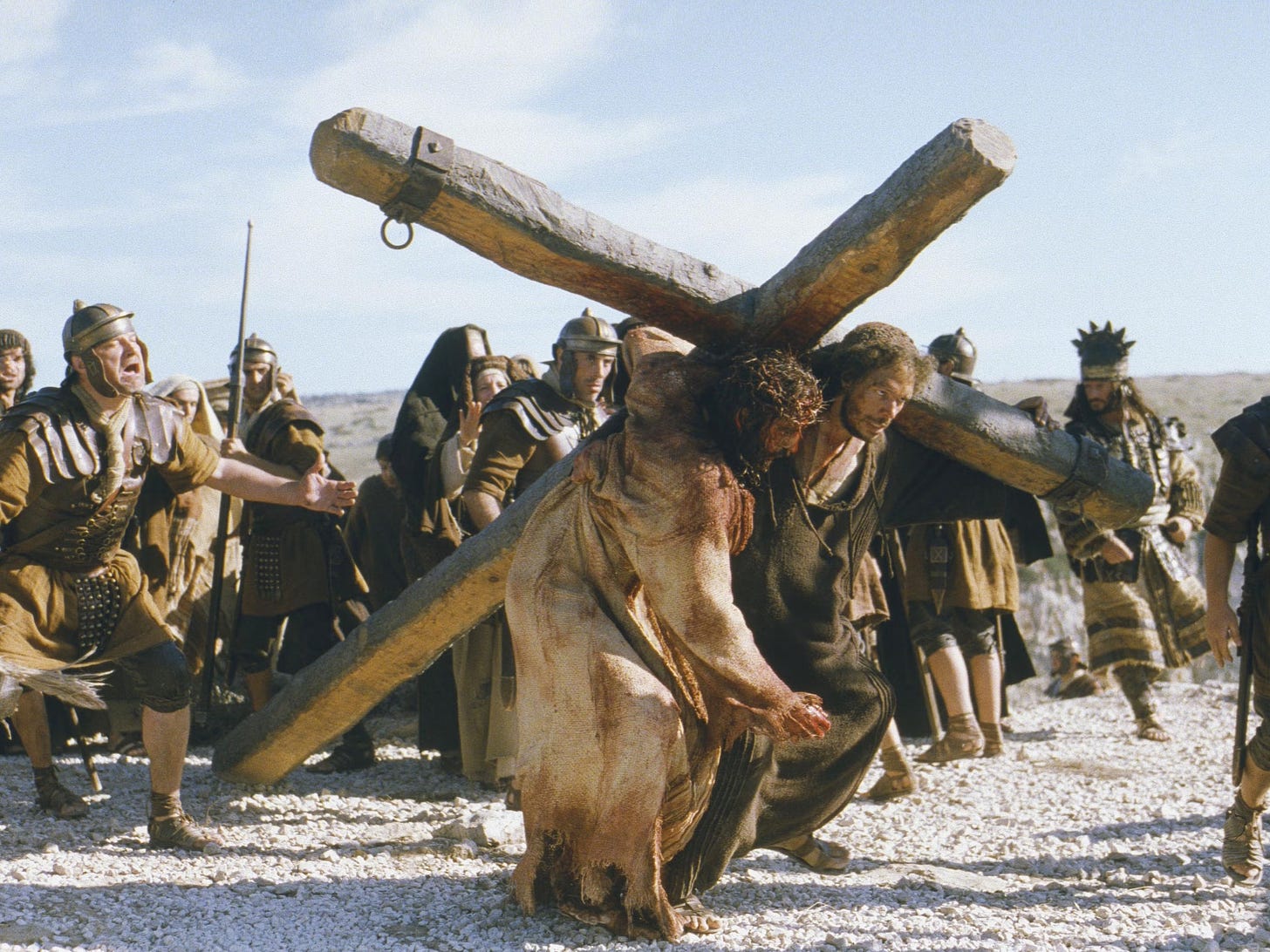
The Passion of the Christ (2004). Distributor: Newmarket Films.
Intro: The Never-ending Rediscovery of Faith-based Films
What if I told you there was a type of movie that:
Could be made cheaply, without big-name celebrities or million-dollar salaries
Came with a built-in audience and thus required minimal marketing
Targets a wildly underserved demographic that encapsulates a significant share of the global population
And what if I told you that mainstream movie studios have largely steered clear of these projects despite clear-cut economic upside? You can probably guess from this essay's title (and Passion of the Christ picture) that I'm referring to faith-based films—movies centered on religious themes that explore messages of belief, morality, and spirituality.
The early 2000s witnessed the emergence of numerous independent studios dedicated to crafting faith-driven narratives for spiritually-minded audiences. Most moviegoers will not recognize the names of these production companies or their films, which has led to a never-ending cycle of cultural amnesia and discovery, a broken feedback loop that goes something like this:
A Faith-based Movie Performs Well at the Box Office: A movie with religious themes comes out of nowhere to make tens of millions of dollars, becoming the top-grossing independent film of its years, like in the case of Heaven is Real, Fireproof, and War Room.
Faith-Based Films are Touted as "The Future of Entertainment": Film executives note the unprecedented success of this release, while dozens of bloggers churn out think pieces exploring how these movies signal a lucrative opportunity for Hollywood.
Everybody Forgets: After a solid week of internet discourse, most people quickly forget the success of this faith-based film and the existence of these independent studios—only to be surprised when another breakthrough hit emerges a year or two later.
Faith-oriented films occupy a fascinating niche within the entertainment industry—insulated from mainstream Hollywood and decidedly idiosyncratic in their production—yet are overlooked relative to their consistent success.
So today, we'll explore the rise of the faith-based film industry, tracing its historical roots and exploring the distinctive economics of these projects. We'll investigate Hollywood's unsuccessful attempts to capture religious audiences and examine why this format remains largely ignored by an industry that generally avoids taking risks.
The Historical Origins of Faith-Based Films
When media outlets cover "faith-based films," they almost exclusively refer to Christian-oriented content designed for Christian audiences. Broadly speaking, Christian films can be grouped into three categories:
Mainstream Hollywood Movies: These films, produced by major Hollywood studios such as Paramount and Universal, span from 1950s biblical epics like Ben-Hur and The Ten Commandments to contemporary narratives incorporating biblical elements, such as Bruce Almighty, The Book of Eli, and Noah. However, Christian audiences have largely rejected the latter because they deal with religious myth and not religious values.
Indie Arthouse Films: Low-budget indies like Martin Scorsesee's Silence, Paul Schraeder's First Reformed, and Terrence Malick's Tree of Life primarily cater to hardcore cinephiles and are helmed by skilled auteurs (who make movies on a variety of topics, not just religion). One could describe these movies as "slow" or "uneventful." I pride myself on staying awake during long, languid films, and I fell asleep during Tree of Life while in the theater (and I'm not afraid to admit this). These stories typically feature characters struggling with aspects of their faith and lack clear resolution. Projects like First Reformed and Tree of Life are decidedly niche in commercial appeal, failing to achieve widespread viewership (including Christian audiences)—but they score well on Letterboxd.
Independent Christian Film Studios: Production companies like Affirm Films and Provident Films focus on producing movies that reflect Christian values for Christian audiences. These studios are little known but have developed a wildly sustainable formula for commercial success.
This analysis will focus on category #3—independent film studios specializing in faith-driven films.
The origins of the contemporary Christian film industry can be traced back to two key inflection points:
The Secularization of Mainstream Movies: Over the last 50 years, an unspoken consensus has emerged within Hollywood: mainstream films would distance themselves from overt religiosity. This divide traces back to the 1970s when Hollywood became increasingly focused on producing blockbusters. Studios shifted toward films with "universal appeal," seeking to replicate the massive commercial success of Jaws and Star Wars. Today, big-budget movies like Exodus: Gods and Kings and Mother! may incorporate elements from biblical stories while downplaying the religious themes associated with their source text.
The Passion of the Christ: One could argue that The Passion of the Christ single-handedly birthed today's faith-based film industry (and they'd be mostly right). Three aspects of this movie and its reception are particularly notable:
Independently Produced: Mel Gibson could not secure funding from major Hollywood studios and was forced to finance the film independently.
Polarized Reception: Mainstream critics derided Passion of the Christ for its religious themes and graphic gore. The media's fierce rejection of a popular movie reflecting Christian values pushed faith-based filmmaking outside the traditional Hollywood system.
The Movie Made Lots of Money: Passion of the Christ is the highest-grossing independent film of all time, bringing in $611M worldwide, thus proving the latent demand for religion-driven stories.
When it comes to the origins of faith-based films, there is pre-Passion of the Christ and post-Passion of the Christ, as Gibson's groundbreaking success sparked a rapid uptick in movies centered around Christian themes.
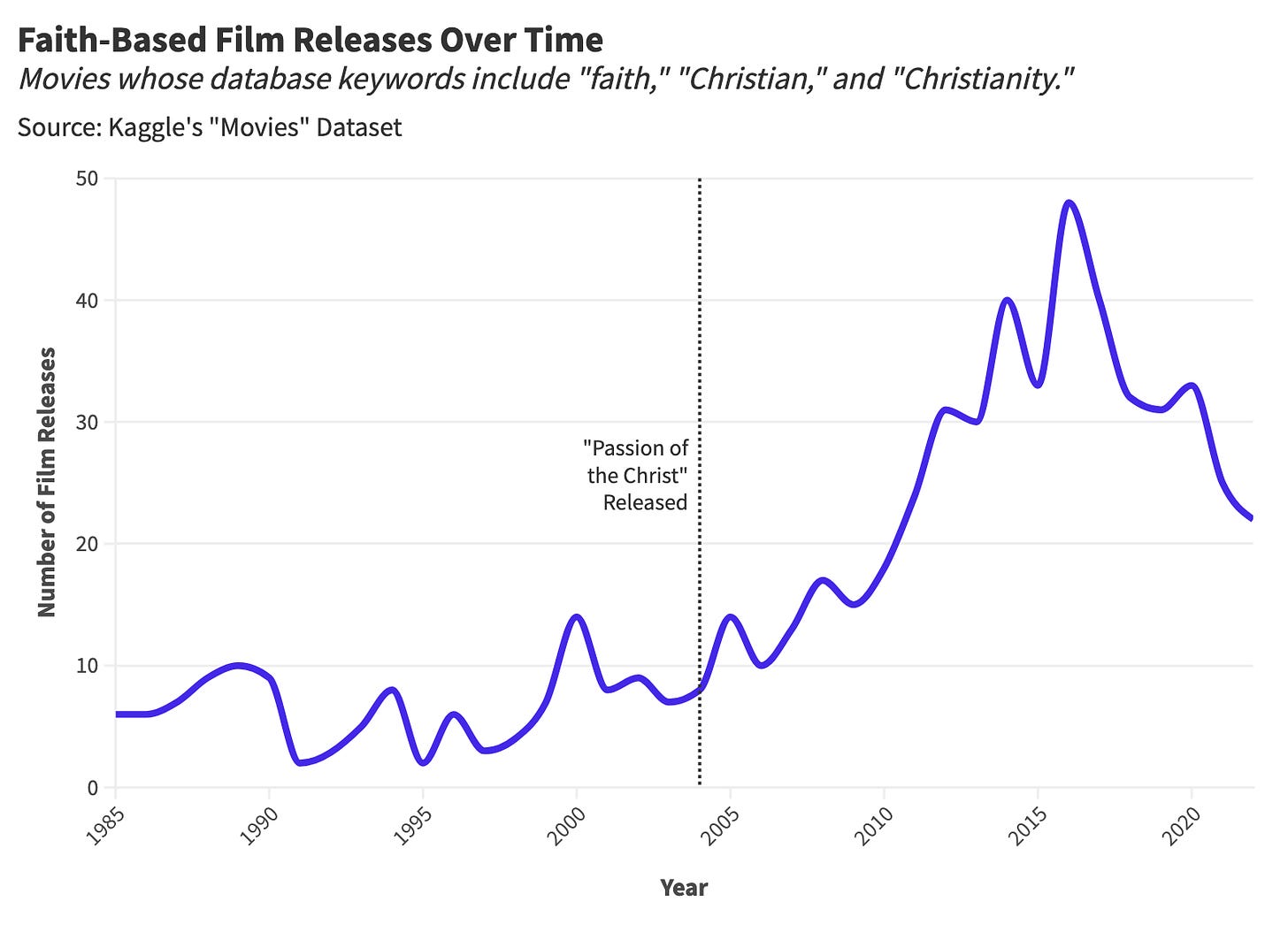
As numerous Christian film studios emerged, they quickly adopted a distinctive business model marked by low risk and high reward—a rarity in the film industry (or any industry).
The Economics of Faith-Based Films
To quantify the economics of faith-based films, we'll compare their financial performance against that of popular movie genres. Obviously, religion-driven projects do not qualify as a standalone genre—there can be Christian comedies, action flicks, and animated musicals (like Veggie Tales!). Instead, this approach aims to understand how various story formats reflect the appetites of their target audience. For example, audiences who like action movies demand grand-scale filmmaking with state-of-the-art visual effects, often leading to higher budgets.
When we analyze average production budget by story format, we find that faith-based films are typically cheap to produce.
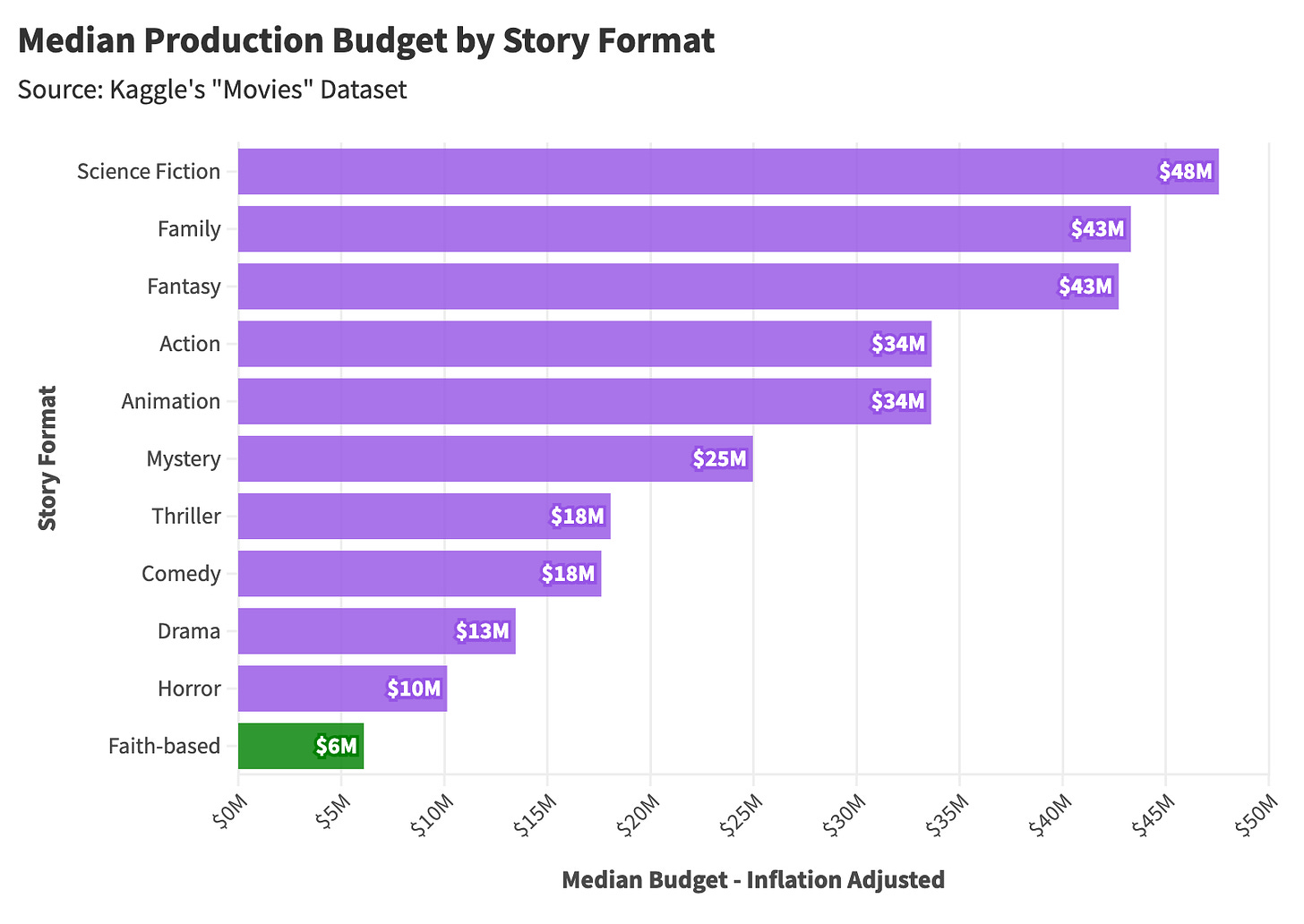
Independent Christian studios follow a well-worn production template that satisfies their target audience while minimizing costs:
Lesser-Known Actors or Former Hollywood Stars: Actors in popular Christian films like God's Not Dead or War Room are frequently unknown to the general public, often cultivating careers within this niche industry. If a performer has name recognition, it usually comes in the form of actors well past their prime. Kirk Cameron and Dennis Quad are perhaps the most visible examples of household names who have found success starring in faith-based films.
Stories are Relatable and Low-Concept: Most movies produced by Provident Films and Sherwood Pictures track an everyday character's struggle with faith. There is no need for over-the-top effects or highly complex plotting. These stories index on relatability and, ultimately, a resolution that affirms the protagonist's commitment to religious values.
Faith-driven movies are often belittled by critics and online ratings, a product of poor production value (stemming from low budgets), a bias against their subject matter, and, well, the fact that some are quite bad. Critics tend to pile on poorly-received Christian films, like in the case of 2015's War Room when media outlets began compiling meta-analyses of the movie's overwhelmingly negative reviews (and people click on this stuff, and I guess I'm now sharing this article so I'm also complicit). Sure, these films aren't great, but online bloggers often sharpen their swords whenever a faith-based movie achieves significant commercial success.
Amongst our list of popular story formats, faith-based projects are significant outliers in terms of average online rating.
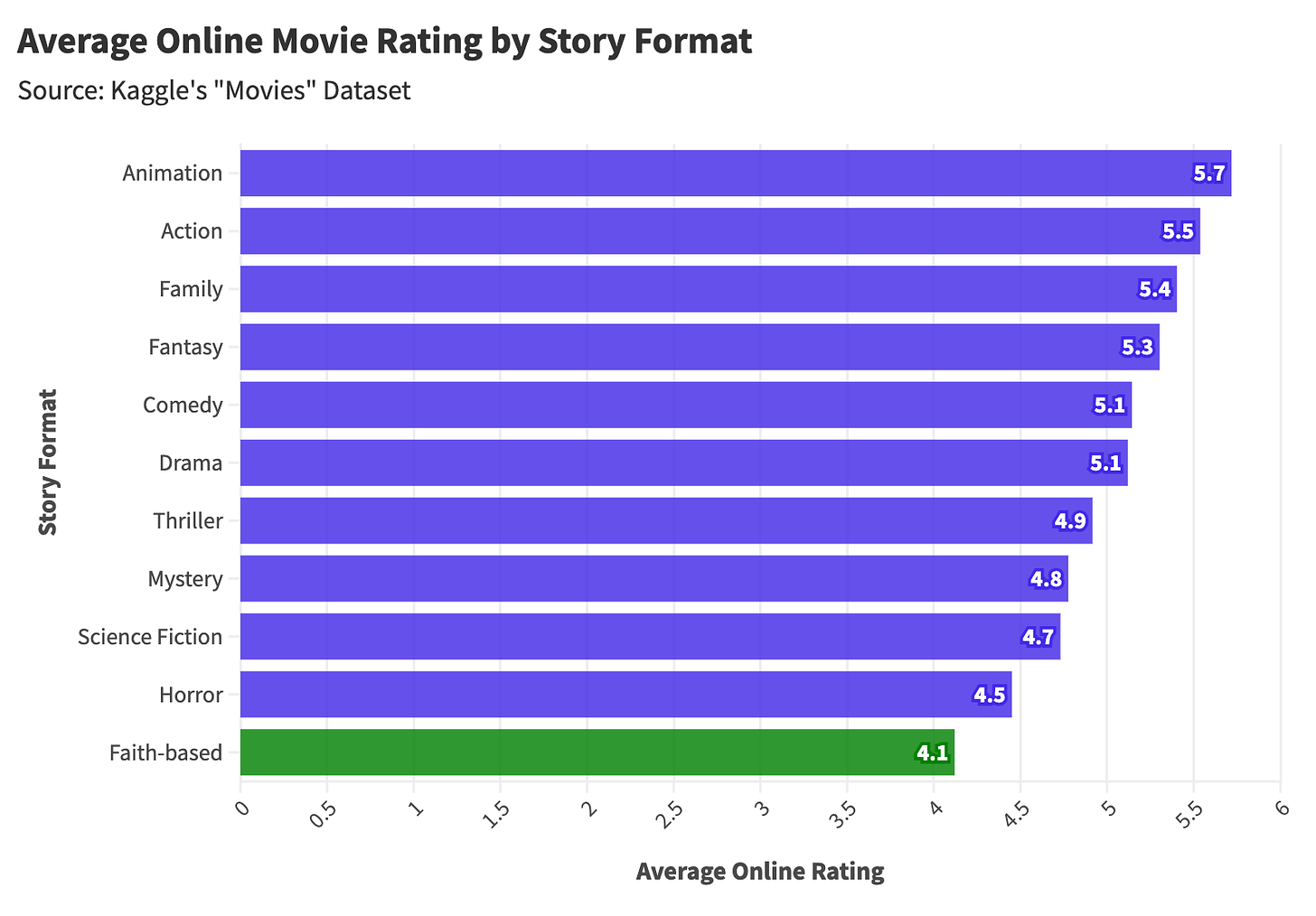
It's not just secularly-minded audiences who disparage these films—the reality is far more nuanced (as is typical of most things). Many Christians are contemptuous of works produced by Affirm Films and Pure Flix, denouncing their oversimplification of religious conviction and predictable plot structuring. In his article, "Where Are All the Great Christian Films?" Christian critic Joseph Holmes argues that the blunt articulation of religious devotion in faith-oriented films often breeds reduced story complexity:
"Christian films almost always seem to have the characters' lives go great once they start trusting God—something every Christian knows often doesn't happen. Protagonists of Christian films trust God and then start winning football games (Facing the Giants), getting totally repaired marriages (Fireproof and War Room), finding the love of their life (Christian Mingle), and repairing race relations (Grace Card and Woodlawn). These films make faith look like a neat formula instead of the complex and difficult relationship that it really is. Atheists and skeptics are typically caricatured and straw-manned and then trounced on by the morally superior Christian leads (God's Not Dead, God's Not Dead 2, Unplanned)."
And yet, despite quality concerns, these movies are consistently profitable, regularly grossing 1.5x their budget (Hollywood's back-of-the-envelope breakeven point). Economically speaking, religion-driven films are most similar to horror movies—wildly profitable despite below-average acclaim. Horror and faith-based films stand out as significant outliers when we chart the percentage of profitable projects against average online rating.
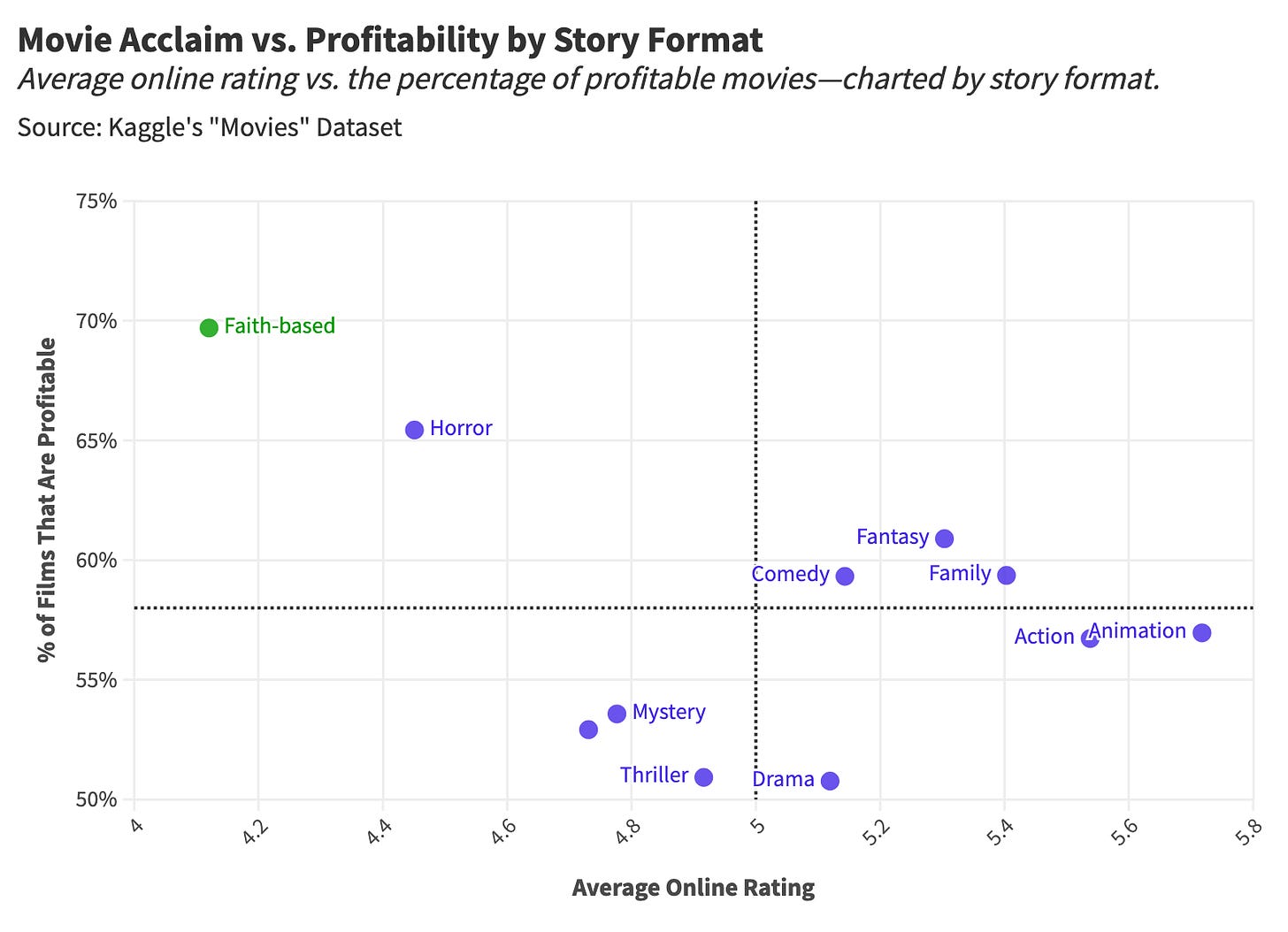
The similarities between Christian films and horror movies have little to do with subject matter—these genres are virtual opposites when it comes to content. Instead, both formats appeal to dedicated audiences who seek themes and story elements that mainstream blockbusters traditionally avoid. For horror fans, it's the one-of-a-kind physiological stimulation (the product of gore, terror, body horror, etc.) that comes from seeing Halloween, Hereditary, The Substance, or Longlegs in a dark theater. For Christian audiences, it's seeing their religious beliefs reflected on screen.
Even the most savagely-reviewed Christian films are overwhelmingly profitable. When we group films by average user reviews and sort them into quality quartiles, faith-based projects show exceptional returns across the board, demonstrating strong performance for poorly rated projects and critically acclaimed films (with at least 50% of movies achieving profitability, no matter their critical reception).
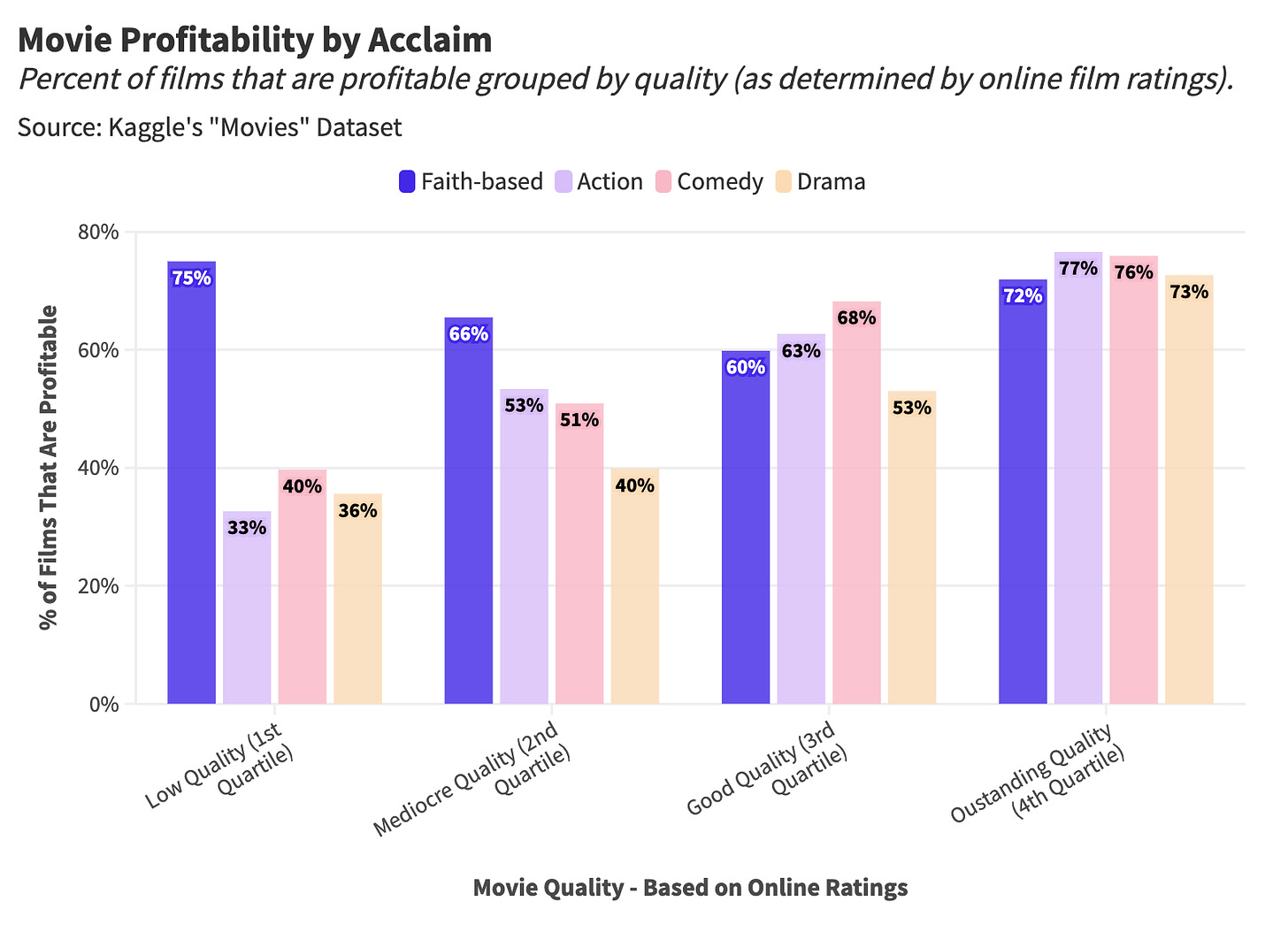
The faith-based film industry has cultivated a replicable and economical formula that consistently satisfies an underserved demographic, no matter the Rotten Tomatoes score.
Final Thoughts: Why Not More?

Hacksaw Ridge (2016). Distributor: Lionsgate Films.
I've long been curious about the unique insularity of the faith-based film industry. In the end, my curiosity boils down to a single economic question:
In an entertainment industry willing to produce utter garbage like The Emoji Movie, The Angry Birds Movie, Madame Web, Borderlands, and an endless slog of superhero reboots, why are there so few mainstream films built around faith? I'm not saying faith-based films are "garbage" but rather questioning why Hollywood will give us a never-ending buffet of franchise spin-offs while avoiding subject matter with proven economic potential. Why is this the one risk Hollywood won't take?
The obvious explanation is that Hollywood studios uphold an unspoken consensus about the secular nature of mainstream films—they may touch on cultural aspects of spirituality from a safe distance, but they steer clear of overt religiosity. The logic underlying this decision (presumably) goes something like this: Blockbuster movies are calibrated for universal appeal, and films about Christianity or Hinduism betray universality. As such, Paramount and Disney must preserve a separation of church and state (despite their status as private institutions).
Personally, I have no strong feelings for or against the mainstreaming of faith-based films. However, I do take issue with Hollywood's ongoing production of bland, monocultural content devised for the broadest possible audience (and little else). Films like Fast X, Ant-Man and the Wasp: Quantumania, and Ghostbusters: Frozen Empire are calibrated for visceral effect and are mostly devoid of ideas (religious or otherwise).
But would this problem be solved if religion were crudely shoe-horned into Disney or Sony's next franchise installment? Consider this goofy thought experiment: imagine if Dominic Toretto (Vin Diesel from Fast & The Furious) was a character with ostensible religious convictions, but that religiosity was then put through a meat grinder of corporate sanitization. Would someone who wants to see their values reflected on screen be content with Disney or Paramount's watered-down, shallow take on faith? I'm not sure anyone would enjoy this.
At some point, Hollywood stopped making many movies to satisfy diverse audiences and started making singular franchise events for every person with a wallet—these movies have no meaningful ideas outside of fan service and the prolonging of a franchise.
Perhaps this explains the never-ending cycle of cultural discovery and amnesia that surrounds faith-based films. At first pass, Hollywood's embrace of religion-driven stories seems like a slam dunk, but upon further inspection, their integration into modern blockbuster filmmaking would breed dissatisfaction.
The story of faith-driven movies is yet another example of Chesterton's Fence: there is likely a reason why things turned out this way, and to disturb this equilibrium would potentially yield lackluster results (displeasing to all). In the meantime, we'll continue writing our think pieces, feigning surprise at the shocking success of this now well-established industry, and subsequently forgetting it exists.
Thanks for reading Stat Significant! Subscribe for free to receive new posts and support my work.
Unlock the Power of Your Data with Stat Significant Consulting!

Struggling to extract insights from your data? Need assistance on a data or research project? Well, you’re in luck because Stat Significant offers data consulting services and can help with:
Insights: Unlock actionable insights from your data with customized analyses that drive strategic growth and help you make informed decisions.
Dashboard-Building: Transform your data into clear, compelling dashboards that deliver real-time insights.
Data Architecture: Make your existing data usable through extraction, cleaning, transformation, and the creation of data pipelines.
Want to chat? Drop me an email at [email protected], connect with me on LinkedIn, reply to this email, or book a free data consultation at the link below.